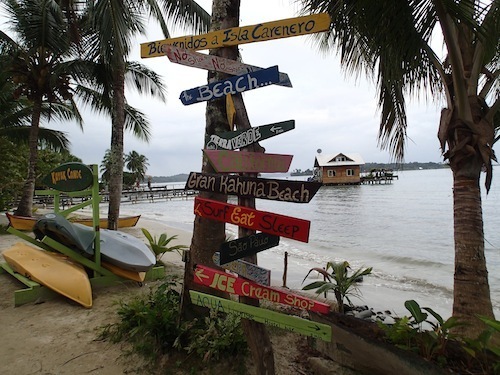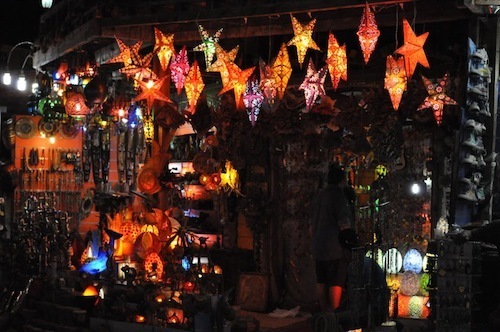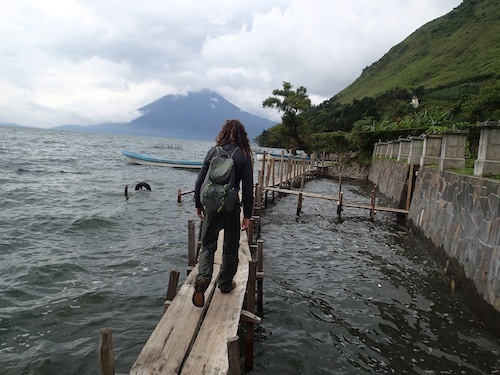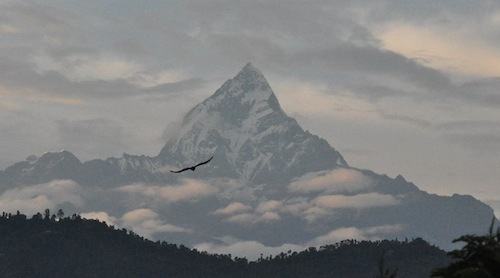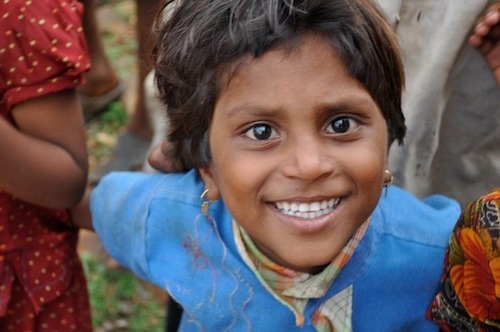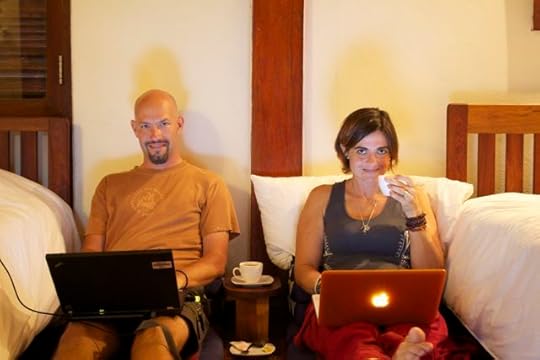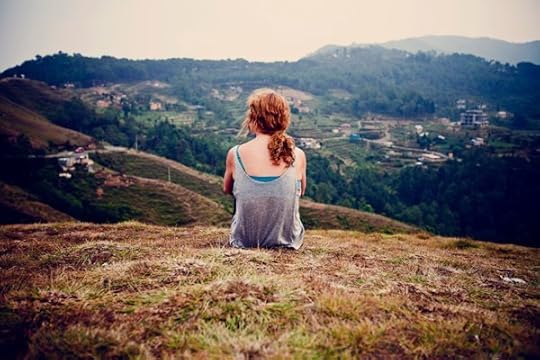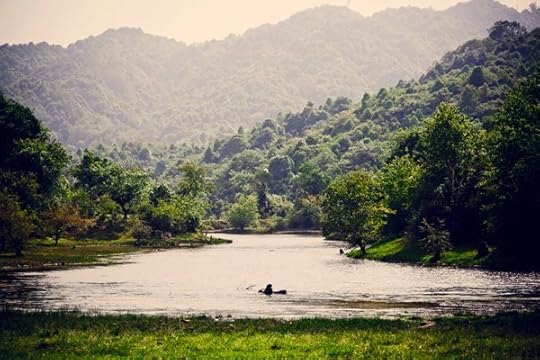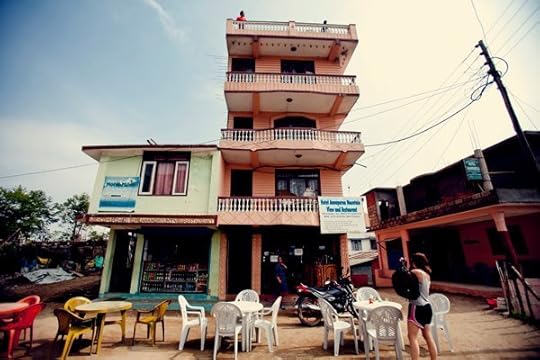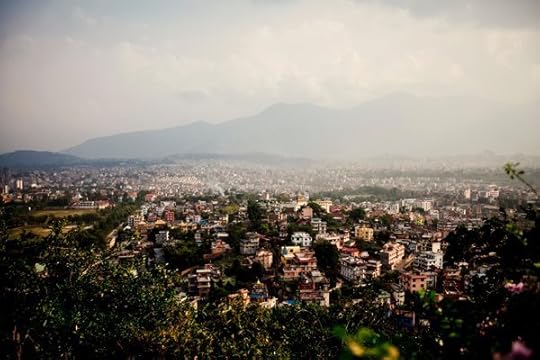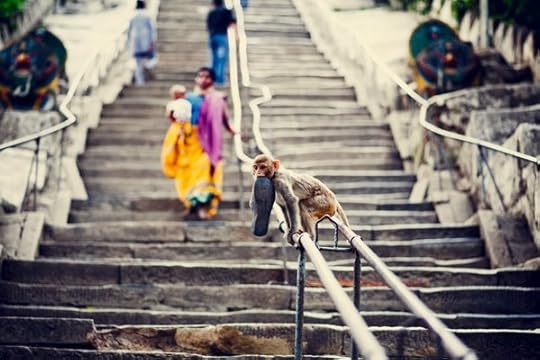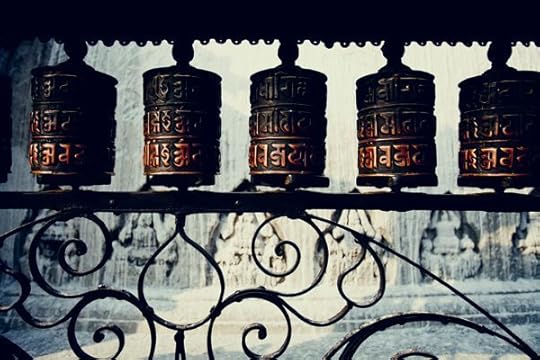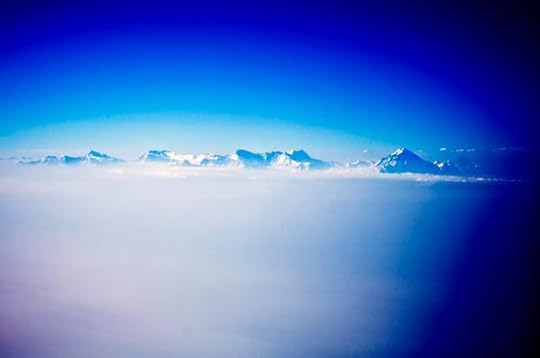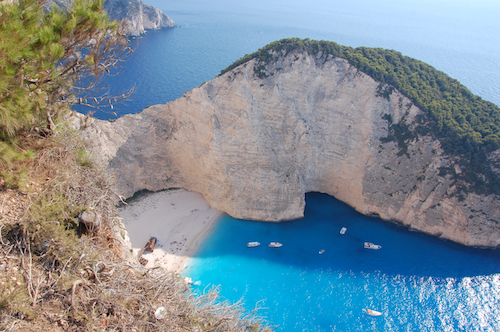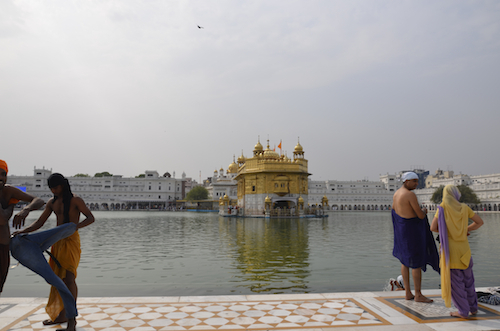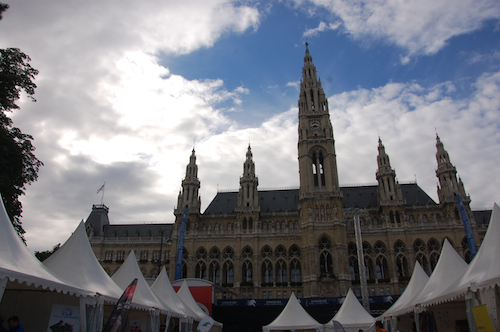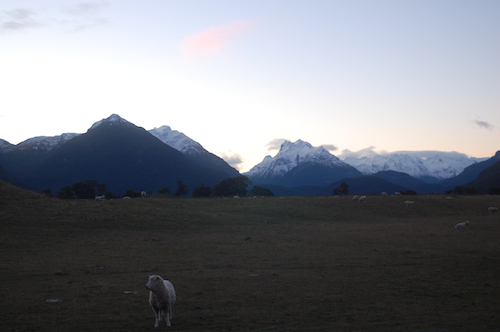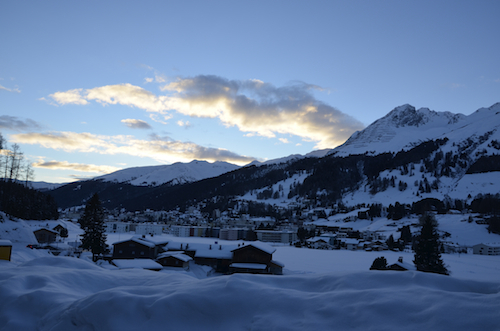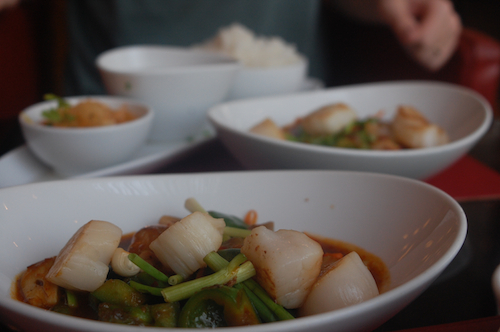Rolf Potts's Blog, page 30
August 21, 2014
When adversity strikes, two things are under your control…
Vagablogging :: Rolf Potts Vagabonding Blog
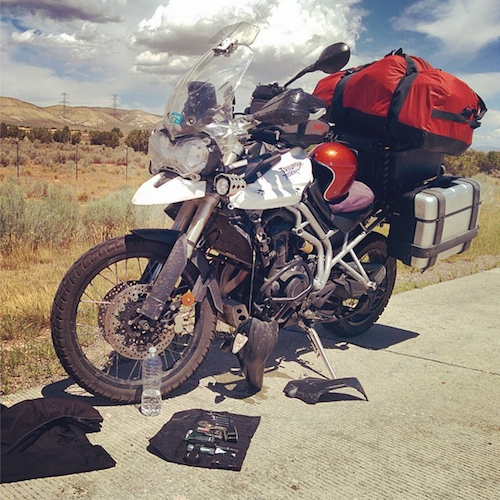
(Working on Trinity)
As you may have guessed from the photo above, the situation with Trinity went further downhill from my last post. Here’s the video I shot at the end of a very long day – when it was clear that Trinity just wasn’t going to make it home.
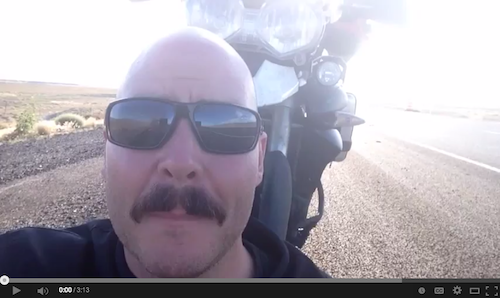
(Click image to watch video)
(Note: excuse the hokey way I linked the video in – I couldn’t figure out how to embed it into the blog!)
From there, I continued limping in to Grand Junction, CO and arranged to pick up Uma the U-Haul. The last few hundred miles were going to be a different type of journey — one where I had to remember how to drive a big(ish) truck! I’ve been on the motorcycle for a few months, so there *was* a learning curve!
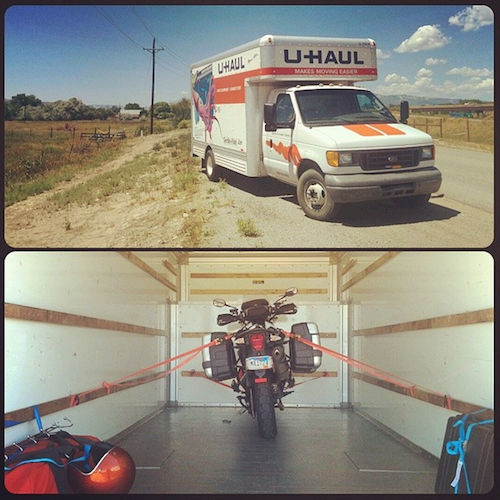
(Meet Uma the U-Haul)
He’s a shot while crossing the Rockies. I really wish I’d been on bike for this, but that just means I’ll have to make another ride down – once Trinity is back on her wheels!
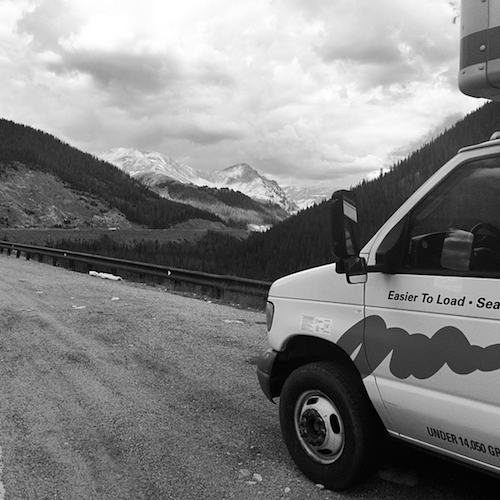
(Uma and the Rockies)
Until next time – travel safe and enjoy the ride!
–
Chris Plough writes and podcasts at oznog.com, where he shares stories and advice from his adventures and from the incredible people that he’s met along the way. You can also follow him on twitter: @chrisplough.
Original article can be found here: When adversity strikes, two things are under your control…
August 20, 2014
Why change is a beautiful thing and why you should travel right now
Vagablogging :: Rolf Potts Vagabonding Blog
How many among us have made the trek back to a favorite destination of years past and realized that, well, it just isn’t the same anymore? The bus drops us off in the sleepy surf town we remember fondly from our first backpacking adventure and we wonder where that Roxy store came from. We hop off of planes and out of cabs and are amazed to see teenagers, clad in jeans and Abercrombie t-shirts, hanging out at Mcdonald’s where women in Saris used to dole out samosas from a road side stand. Dirt roads that once flooded with every rain are now paved and outfitted with perfectly placed gutters. Little girls who used to sell flowers are now young women, married, and calling after children of their own- children who will never sell flowers to help their families make ends meet.
We sit in our favorite restaurants and coffee shops (because, thankfully, some of those are still standing) and reminisce about the crazy party hostel that once stood where the Marriott now towers and the place on the corner where you used to be able to by a $1 beer to enjoy while you watched the sunset on the beach. We whisper that the taxi drivers have certainly figured out how to fleece the tourists and pray that the charm that has always made this place special doesn’t get erased completely. Mostly, we are just happy that we saw this place as it was, way back, before all the change happened.
Sometimes it’s sad to return to a place and realize just how much has changed. You miss what you have romanticized and forget about that miserable night you got infested with bed bugs at that crazy party hostel. There is something very human in the desire to return to a place you “know” and wrap yourself in the comfort of familiarity. Change can wreak havoc on that comfort.
But there is a wonderful side to all of that change. Perhaps one of the most beautiful things that traveling affords us is the ability to see the world for the ever evolving organism that it is. Yes, things change. Yes, things we remember and love may not always be there. But isn’t that knowledge actually wonderful? It reminds us that the world is only “as it is” for this moment. It will never be like this again. We can wait until “someday” to travel or we can do it right now, knowing that “someday” will never look like today. As an added bonus, we can travel today AND “someday”, and our experiences will be inexplicably similar and different all at once.
The only real certainty is change. Travel gives us space to explore what that change means (and looks like). Eyes that have come and gone and come back again have the privilege of seeing change in a comparative manner. Minds that have explored new places and returned have the ability to put change into a global context and see history playing out before their eyes. Individuals that have returned have the opportunity to discover how change might even be shaped by the most positive and intentional parts of our collective humanity. We are so very lucky to see our world, as it is, no matter what it looks like in this moment. Because what is right now, is ours- just for this moment. There are no guarantees that it will ever look, fell, or pulse exactly like this again.
The world is changing, as it always has. So, then this is the perfect time to get up and explore our world. You wouldn’t want to miss what it looks like right now, would you?
Original article can be found here: Why change is a beautiful thing and why you should travel right now
August 19, 2014
Vagabonding Case Study: Paul Farrugia & Karen Sargent
Vagablogging :: Rolf Potts Vagabonding Blog
Paul Farrugia & Karen Sargent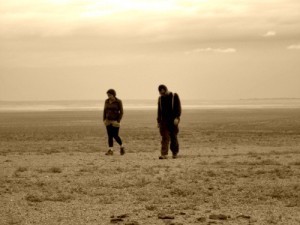
Age: 39 & 36
Hometown: Birmingham, England & Malta
Quote: “Twenty years from now you will be more disappointed by the things that you didn’t do than by the ones you did so. So throw off the bowlines. Sail away from the safe harbor. Catch the trade winds in your sails. Explore. Dream. Discover.” Mark Twain
How did you find out about Vagabonding, and how did you find it useful before and during the trip?
We read the book before we went on our 18 month trip and it really helped to put us in the right frame of mind.
How long were you on the road?
For the first trip, 18 months but we have not really stopped since then.
Where did you go?
Well we traveled from England to Asia without using planes. Here is the list: England, France, Germany, Russia, Mongolia, China, South Korea, Japan, Thailand, Cambodia, Laos, Vietnam, Philippines, Malaysia, Singapore, Indonesia, Australia.
What was your job or source of travel funding for this journey?
Paul sold his house and car, Karen saved money.
Did you work or volunteer on the road?
Yes, we volunteered on a boat in Malaysia, in a school in Thailand and on an ashram in Australia. That’s why we have volunteering opportunities on our site to help other travellers find free or low cost placements.
Of all the places you visited, which was your favorite?
Oohh, that’s too hard. It changes all the time. Today it’s Mongolia.
Was there a place that was your least favorite, or most disappointing, or most challenging?
China was the most challenging. We got scammed and sometimes the rail journeys were tough going but we still loved it and would go back tomorrow.
Which travel gear proved most useful? Least useful?
Most useful would be duct tape! Especially on night trains as the a/c is so cold so we would tape over the vent with newspaper. Least useful would be most of the clothes we took. Never again!
What are the rewards of the vagabonding lifestyle?
Freedom without a shadow of a doubt. After the initial 18 months we vowed to keep the sense of freedom we had travelling. We are lucky enough to say that we have.
What are the challenges and sacrifices of the vagabonding lifestyle?
Not seeing family and friends as much as you would like. Not having a routine which sometimes we all need. erm, thats about it, what can we say, we love the lifestyle!
What lessons did you learn on the road?
The main one is that 99% of people are good. No matter where you are, people will help and share with you. We learnt how to let go and plan a lot less. In the end we just went with the flow. We also learnt that we don’t need to buy half the crap that we do! We never missed any of our possessions back in storage in England.
How did your personal definition of “vagabonding” develop over the course of the trip?
Well it’s still happening. We now live 4/5 months on the road and 6/7 months in London. We do this by renting out our place, working freelance and spending the money we do earn on travel as opposed to stuff we don’t need.
If there was one thing you could have told yourself before the trip, what would it be?
Plan less and just go.
Any advice or tips for someone hoping to embark on a similar adventure?
Less is more. It’s better to see less countries and stay longer in places. That way you really get under a countries skin and start living like a local. Plus you make much more meaningful connections that way.
When and where do you think you’ll take your next long-term journey?
We normally leave for European winter. We don’t really decide until a few months before ( you see, less planning!) but so far, Namibia, Mozambique, Argentina and Canada have sprung to mind.
Read more about Paul and Karen on their blog, Global Help Swap, or follow them on Facebook and Twitter.
Website: Global Help Swap
Twitter: @globalhelpswap
Are you a Vagabonding reader planning, in the middle of, or returning from a journey? Would you like your travel blog or website to be featured on Vagabonding Case Studies? If so, drop us a line at casestudies@vagabonding.net and tell us a little about yourself.
Original article can be found here: Vagabonding Case Study: Paul Farrugia & Karen Sargent
August 18, 2014
Considering a career break? The time is now: Meet. Plan. Go.
Vagablogging :: Rolf Potts Vagabonding Blog
Too many of us are stuck on the merry-go-round of dreaming about a long term travel adventure and a break from the 9-5 of our careers. It seems like something that other people get to do, the lucky ones, not us. So, we stalk their blogs, we wish we knew where to start, we keep dreaming, but we remain stuck where we are.
Sound familiar?
If that’s you, if you’ve been longing to take the plunge, have an adventure and recreate your life and career on your own terms then you don’t want to miss Meet. Plan. Go. It’s a one day event, limited to only 150 participants, in NYC on September 20th. Designed by Sherry Ott and friends to give you the inspiration, encouragement and tools you need to get serious about planning, and more importantly actually taking, that career break you’ve been thinking about.
Rolf is going to be there, along with a whole team of career break veterans who will speak from personal experience about the benefits and challenges of taking the leap. Whether you’re planning a solo trip, or a year of travel with your whole family, there will be experts on hand to help move you forward.
Space is limited. Time is limited. The possibilities are endless.
Original article can be found here: Considering a career break? The time is now: Meet. Plan. Go.
Considering a. career break? The time is now: Meet. Plan. Go.
Vagablogging :: Rolf Potts Vagabonding Blog
Too many of us are stuck on the merry-go-round of dreaming about a long term travel adventure and a break from the 9-5 of our careers. It seems like something that other people get to do, the lucky ones, not us. So, we stalk their blogs, we wish we knew where to start, we keep dreaming, but we remain stuck where we are.
Sound familiar?
If that’s you, if you’ve been longing to take the plunge, have an adventure and recreate your life and career on your own terms then you don’t want to miss Meet. Plan. Go. It’s a one day event, limited to only 150 participants, in NYC on September 20th. Designed by Sherry Ott and friends to give you the inspiration, encouragement and tools you need to get serious about planning, and more importantly actually taking, that career break you’ve been thinking about.
Rolf is going to be there, along with a whole team of career break veterans who will speak from personal experience about the benefits and challenges of taking the leap. Whether you’re planning a solo trip, or a year of travel with your whole family, there will be experts on hand to help move you forward.
Space is limited. Time is limited. The possibilities are endless.
Original article can be found here: Considering a. career break? The time is now: Meet. Plan. Go.
August 17, 2014
Mike Spencer Bown on the dark side of travel and technology
Vagablogging :: Rolf Potts Vagabonding Blog
“It used to be that you would hardly ever see anyone you met ever again. With the advent of email, the half-life of a friendship was about a year. Keeping up with mail tended to fall off at that rate, but with Facebook it lasts forever. There is a dark side, however. Over the last several years I’ve often found entire hostel common rooms, with perhaps 40 backpackers, all absorbed in smartphones and tablets, barely aware of each other’s presence.”
–Mike Spencer Bown, What I’ve Learned: The World’s Most Traveled Man, Esquire, 10/25/13
Original article can be found here: Mike Spencer Bown on the dark side of travel and technology
August 16, 2014
A week in Nepal
Vagablogging :: Rolf Potts Vagabonding Blog
Not too long ago my friend and I went to Nepal during our 8 month round the world trip. It was a last minute stop-over (escape) during our three weeks in India, and we were pleasantly surprised with how beautiful and easy it was compared to the chaos we were experiencing in India. We were supposed to take an overnight train and bus from New Delhi, but after missing the train had to book a last minute flight to Kathmandu. We took a cab to Nagarkot, a village in the mountains, and stayed at a cute hotel.
After resting for a day, we decided to go on a three day trek that our hotel helped arrange. We had a great guide named Bikram who works for a Territory Himalaya (we highly recommend him) and left the next day. It was considered one of the easier treks you can do, but it was as hot as can be and by the end of the three days I dropped a few pounds for sure.
After hiking all day up and down and through the woods then back into the sun, we made it to a small hotel for the night. We were hiking towards Chisapani, where we would stay our last night before hiking and then getting a local bus back to Kathmandu.
We had fried rice for just about every meal it seemed like, which wasn’t so bad. For me, as usual, the switchbacks in the sun were the hardest part. I’m the slowest person on pretty much any hike I do, always bringing up the rear. The scenery was beautiful, we walked through villages in the mountains that seemed cut off from almost everything, through thick forests in the shade, down mountains, and along dirt roads. Sadly the only view we ever had of the Himalayas was from the plane, it was too foggy the week we were there to see them, but normally they are a regular part of the view.
After our hike we spent a couple nights in Kathmandu, which was one of my favorite cities along our trip. It was full of interesting shops and restaurants and people from all over the world. We visited the Monkey Temple. Those monkeys were mean. I saw them stealing people’s shoes and ice cream cones.
The people in Nepal we very warm and friendly. I would definitely recommend spending time in the city and in the mountains. I felt safe there, though safer in the mountains than in Kathmandu at night. I really hope to make it back there in the next few years to do the Annapurna Trek, which my friend got to return to do and loved.
Original article can be found here: A week in Nepal
August 15, 2014
The Worst Tourists in the World
Vagablogging :: Rolf Potts Vagabonding Blog
 I read with interest a recent study by the Trans-Global Association for Travel and Tourism Commerce, which rated the behavior of tourists from all the world’s industrialized countries. Consistently ranking last in the study — bottoming out in categories ranging from airline etiquette to podiatric hygiene — were travelers from Great Britain. “This settles it,” a TATTC spokesperson was quoted as saying. “The British are the worst tourists in the world.”
I read with interest a recent study by the Trans-Global Association for Travel and Tourism Commerce, which rated the behavior of tourists from all the world’s industrialized countries. Consistently ranking last in the study — bottoming out in categories ranging from airline etiquette to podiatric hygiene — were travelers from Great Britain. “This settles it,” a TATTC spokesperson was quoted as saying. “The British are the worst tourists in the world.”
Actually, I’m just kidding. There is no such thing as the Trans-Global Association for Travel and Tourism Commerce. I made it up just now, because I know that people like to obsess over international rankings, and I’ve been looking for a chance to poke fun at the British.
Mind you, I don’t really think the British are bad tourists. To the contrary, I’ve usually found travelers from the U.K. to be friendly, well read, and quite prolific in their wanderings. You can find Brits in all corners of the world, from Valparaiso to Vladivostok, and they most always make good travel companions.
The problem I have with the British, however, is that — to a bigger extent than other travelers I’ve met — they seem to be obsessed with stereotypes of national character.
I used to think that British travelers were just disproportionately gung-ho about bashing Americans (apparently, we’re noisy, over-religious, and we’re supposed to use a “u” when we spell “color”). Over time, however, I’ve discovered that Brits also hold strong preconceptions about nearly every nationality in the travel milieu, from the Swiss (officious and dull), to the Japanese (unimaginative and over-polite), to the Argentines (narcissistic and sex-obsessed).
In fact, were I to base my perceptions entirely on the basis of Britannic generalizations, I could very well conclude that the world’s worst tourists are roughly categorized as follows:
Americans: Ignorant. Loud. Oblivious to surroundings. Insincere.
French: Rude. Bigoted. A trifle out of touch with reality.
Germans: Humorless. Rule-obsessed. Unfriendly. Stubborn.
Israelis: Rude. Cheap. Arrogant. Cliquish.
Canadians: Exactly like Americans, but more polite, less ignorant, and twenty times more boring.
Before I go any further here, I will admit three things. First, I realize the circular logic inherent in making generalizations about the generalizations of British travelers (and I apologize if you happen to be one of those Brits who isn’t a nationalistic busybody). Second, I realize that half the readers who’ve stumbled across my column this week have skipped straight from the headline to the above list, and are now typing angry things in the comments section below (especially if they happen to be American, French, German, Israeli, or Canadian). And, third, I’ll concede that the British fixation with national character reveals an impressive knack for world geography (in contrast to us Americans, who associate “Vienna” less with a European city than with canned snack sausages).
Were I a more meticulous analyst, I might posit that this British tendency is the cultural residue of Victorian-era self-superiority (vivid examples of which can be found in most any 19th century British travel guidebook, one of which described Valencian Spaniards as “perfidious, vindictive, sullen, mistrustful, fickle, treacherous, smooth, empty of all good, snarling and biting like hyenas, and smiling as they murder”). Since I’m no scholar, however, I’ll just point out that the British affinity for stereotyping their fellow wanderers is a mostly harmless amplification of what all travelers do from time to time.
The problem here is that assessing your travel companions by nationality is rarely an earnest inquiry so much as it is a dull parlor game — an empty exercise in rhetorical one-upmanship. The worst travelers in the world are, after all, the rude, small-minded ones — and rude, small-minded travelers can hail from any nation.
Moreover, most hostel-lounge arguments about which countries export good or bad travelers fail to take in the local perspective. A few years ago, a survey conducted by international tourist offices found that the oft-disparaged Germans and Americans were rated most favorably by host communities around the world. This rating didn’t hinge on cultural or aesthetic opinions, but the simple fact that Germans and Americans spend money more generously than their tourist counterparts. Economic benefit, it would appear, was more important to local hosts than the common traveler obsessions with fashion, geopolitics, and collective behaviors in tacky backpacker nightclubs.
My point, then, is a simple one: The next time you find yourself in a heated argument over which nation produces the best or worst tourists, this is probably an indicator that you’ve been spending too much time yapping in hostel lounges and not enough time outside having engaged adventures.
And that, in its own way, means you’re a bad tourist.
Tip sheet: How to avoid being an ugly American (or wherever it is you’re from)1) Study up on the local culture.
Get to know something about a place before you go there. Read novels and travel books about the region, and study guidebooks to learn about customs, manners, and cultural norms. Learn a few phrases of the language (such as greetings, thank yous, numbers, and food terms). Keep in mind that culture expresses itself at an instinctive level — not an intellectual level — and that different standards of time, courtesy, and personal service may apply in far-off lands.
2) Listen, and ask questions.
On the road, make it a habit to talk less and listen more. Travel is hardly the time to extol the virtues (or shortcomings) your home country; instead be curious about how people think in the place you’re visiting. Ask follow-up questions. Seek to maintain open-mindedness, which is a process of listening and considering — of muting your compulsion to judge what is right and wrong, good and bad, proper and improper, and having the tolerance and patience to try and see things for what they are.
3) Avoid arguing politics.
Avoid political proselytizing, regardless of which end of the political spectrum you think you represent. At home, political convictions are a tool for getting things done within your community; on the road, political convictions are a clumsy set of experiential blinders, compelling you to seek evidence for conclusions you’ve already drawn. If you really are liberal and enlightened (or conservative and informed) you will stop yammering about politics and learn something about the culture you’re visiting.
4) Avoid traveling in large groups.
If your sorority or church group or wiccan pilates club decides to travel to Paris or Quito or Bangkok as an eight-some, do everyone a favor and split into groups of two. This will make you less noisy, less self-enclosed, more approachable, and more open to what’s going on around you. If nobody wants to split off from the group with you, tackle the day solo. I guarantee that you will have more memorable adventures on your own than with a big group of travelers.
5) Give respect and you get respect.
Having rigid stereotypes about individuals you haven’t taken the time to know is silly in all contexts. As a representative of your own country, the best way to win respect is to show respect to everyone you meet. Odds are, your hosts will return the favor.
[This Rolf Potts article originally appeared in Yahoo! News on Oct. 9, 2006. All rights reserved.]
Original article can be found here: The Worst Tourists in the World
August 14, 2014
Vagabonding Case Study: Johnny Isaak
Vagablogging :: Rolf Potts Vagabonding Blog
Johnny Isaak
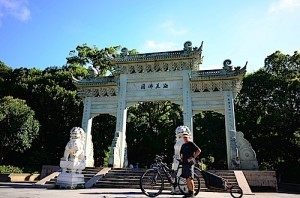
Age: 54
Hometown: Pocatello, Idaho
Quote: “A ship is safe in harbor, but that’s not what ships are for.” — William G.T. Shedd
How did you find out about Vagabonding, and how did you find it useful before and during the trip?
Google search. An independent travel philosophy. Tips and techniques for travel.
How long were you on the road?
Three months.
Where did you go?
Eastern China (Zhejiang, Anhui, Shanghai, Suzhou, Hangzhou, Putuoshan, Wenzhou)
What was your job or source of travel funding for this journey?
Self funded from job earnings.
Did you work or volunteer on the road?
No, but plan to the future.
Of all the places you visited, which was your favorite?
Shanghai, Putuoshan.
Was there a place that was your least favorite, or most disappointing, or most challenging?
No. They all had their pros and cons.
Which travel gear proved most useful?
My bicycle.
Least useful?
Excess clothes.
What are the rewards of the vagabonding lifestyle?
The ability to more deeply immerse one’s self into regions, lands, peoples and cultures. The ability to travel long distances for long periods of time on little cash.
What are the challenges and sacrifices of the vagabonding lifestyle?
Transitioning to a minimalistic lifestyle of living on the road.
What lessons did you learn on the road?
There is a lot more gray than black and white. As humans, we are more similar than dissimilar.
How did your personal definition of “vagabonding” develop over the course of the trip?
Development of a greater, deeper understanding of minimalistic, independent travel. Long distance cycling is the perfect compliment to vagabonding travel.
If there was one thing you could have told yourself before the trip, what would it be?
Take less stuff. When you get all of your gear laid out, cut it in half. You always take more than you really need.
Any advice or tips for someone hoping to embark on a similar adventure?
To go, go now before it is all gone. Globalization is changing the world and making us all the same. Unique cultures and societies are all fading away and will be lost to the ages.
When and where do you think you’ll take your next long-term journey?
Two months this summer, then permanently in early 2015 following my retirement. I’m a burgeoning cycling trekker who’s fully embraced the vagabonding lifestyle since 2006.
Are you a Vagabonding reader planning, in the middle of, or returning from a journey? Would you like your travel blog or website to be featured on Vagabonding Case Studies? If so, drop us a line at casestudies@vagabonding.net and tell us a little about yourself.
Original article can be found here: Vagabonding Case Study: Johnny Isaak
August 13, 2014
7 paradises for 7 loves
Vagablogging :: Rolf Potts Vagabonding Blog
I have recently decided that wander-lusters come in many varieties- many more than I had thought. You know, we like to find our commonalities so it is comfortable to believe that a traveler is a traveler is a traveler is a traveler. But one man’s treasure is another one’s trash. That is true for the non-material treasures we find out on the road just as it is in “real life” back home with material things.
For instance when my husband and I were conversing about the reasons why we travel, one man said that our travel style would not be his idea of a good time at all, even though he considers himself a traveler too. For him, travel is about photography and natural beauty. And if he can’t take his camera lenses somewhere, then it won’t be as joyful to be there.
The fact is, there are as many types of travelers as there are types of people. There are people who love history and that’s why they travel. And people who love people and that’s why they travel. Or people who love animals and that’s why they travel. It goes on and on.
Of course, most of us who love travel probably have many passions sourcing that love. We love people and adventure and culture and artwork and nature…and that is why we travel.
For that reason, it can be hard to answer that question…”Where was your favorite place to travel to?” One place fuels one passion while another place fuels another.
Thus, I give you my 15 paradises for my 15 different passions.
1.) Zakynthos- paradise for the lover of simplicity.
Zakynthos is just the place to go to feel like the rest of the world’s hustle is out of reach. The towns are small and everything is on “island time.” The day’s itinerary often included “jumping into blue water” and “riding a scooter along the cliffs.”
2.) Amritsar- paradise for the lover of culture.
Amritsar is essentially the birthplace of the Sikhs and is home of their most important temple, the Golden Temple. Unlike some religious sights, the Golden Temple is both accommodating to tourists and apathetic of them. I love that. They are purely going about their own religious duties here and while tourists are welcome (as long as they cover their heads and remove their shoes,) there are no disgenuine displays for them.
It’s a place to soak up a genuinely fascinating series of religious practices. Men and women bathe in the waters, there is a kitchen dedicated to serving literally thousands of poor people and visitors, and many of the men have enormous turbans and long swords at their sides, important pieces of the Sikh disciplines.
3.) Vienna, Austria- paradise for the lover of architectural beauty.
Anyone who’s been to Prague disagrees with me on this but I have yet to see Prague (hopefully this fall). So until I see Prague, Vienna wins out as my favorite city for architectural beauty. Every building has that gorgeous stature of something built in a time when things were beautiful instead of efficient. The effect is quite romantic. Unfortunately the Rathaus, one of the most impressive buildings in Vienna, is frequently hosting private festivals, parties, events, etc. So you cannot always get very close to it if a special event is going on.
Not to worry though. Every other building is beautiful too.
4.) Queenstown, New Zealand- paradise for the lover of adventure sports.
Queenstown is not only gorgeous but also has at least three different area mountains for skiing, snowboarding, etc. etc, including The Remarkables which are…remarkable! But you aren’t out of luck if you dislike skiing or snowboarding. You can go sky-diving or hang-gliding or hiking. There’s something for everyone.
5.) Switzerland- paradise for the lover of natural beauty.
Switzerland is full of incredible views at every turn. Just driving to your destination is an activity in and of itself simply for the scenery throughout the Swiss Alps. Unfortunately, it’s heinously expensive.
6.) Bangkok, Thailand- paradise for the lover of delicious, affordable food!
I love Thai food. Everything from the fried noodle dishes of Pad Thai and Pad See Ew to the soups like Tom Ka Gai and Tom Yum. Thai food is full of the delicious flavors of kefir lime, lemongrass, ginger, coconut milk and other novel things. If you like spicy food go for the Pad Kra Pow (minced chicken in peppers and basil) or if you like the sweeter dishes, go for the Tom Ka Gai, (a coconut based soup with straw mushrooms, pea eggplants and other quintessentially Thai ingredients.)
Bangkok in particular is a good spot for Thai food because you will be able to find Northern Thai dishes as well as Southern Thai dishes. Also Bangkok has lots of street vendors with quality dishes for sometimes even less than a dollar.
7.) Fiji- paradise for the lover of exotic snorkeling.
Fiji is not only home to some pretty amazing tropical fish, but to some impressive soft corals as well, which contributes greatly to its popularity as a spot for diving and snorkeling. Snorkeling is a beautiful adventure in the Yesawas where there’s no telling what you’ll see in the clear waters. (…anyone know what that thing in the picture is? We could never figure it out!)
Next time someone asks you where your “favorite place to travel” is, what will you say? Do you have a favorite place for each of your interests?
Original article can be found here: 7 paradises for 7 loves
Rolf Potts's Blog
- Rolf Potts's profile
- 323 followers


